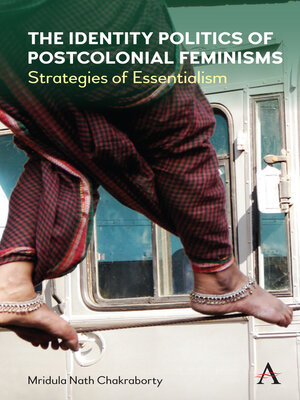The Identity Politics of Postcolonial Feminism
ebook ∣ Strategies of Essentialism
By Mridula Nath Chakraborty

Sign up to save your library
With an OverDrive account, you can save your favorite libraries for at-a-glance information about availability. Find out more about OverDrive accounts.
Find this title in Libby, the library reading app by OverDrive.



Search for a digital library with this title
Title found at these libraries:
| Loading... |
The rise of identity politics in post-Civil Rights Anglo-North America was marked by intense debate in the university and public space about the valency of competing identities in the new America that was taking shape due to changing migration policies. The historically unresolved tension between Black and White constituencies was complicated further due to the entry of bodies from the newly independent, decolonized third world nations who did not share the same racial and cultural lineage. At the same time, feminism permeated every sphere of intellectual and social life, giving rise to second-wave questions around who constituted the true subject of feminism. Postcolonial feminists interrogated the idea of an essentialised 'Woman' who was implicated in the twin strands of race and nation that identified mainstream feminisms. The Identity Politics of Postcolonial Feminism traces the evolution of postcolonial feminism from its situated, located, 'third world' avatar to its current free-floating reincarnation as transnational feminism in the age of mobility and identity.
|The Identity Politics of Postcolonial Feminism is a first-instance analysis of the strategic essentialisms effected by five postcolonial feminists in the contemporary Anglo-North-American academy: Himani Bannerji, Inderpal Grewal, Chandra Talpade Mohanty, Sherene H. Razack and Gayatri Chakravorty Spivak. The years 1980-2000 are marked by intense debates in hegemonic Anglo-American feminist theory on the issue of sexual differentiation as the determining factor of feminist experience, method, knowledge and practice. Racialised feminists from the constituencies of Black and postcolonial feminisms and of feminisms of colour oppose gendered essentialism on the grounds of their differential locations and oppositional histories of consciousness. In the displaced, diasporic space of white settler colonies, scholars from the third world are invited to and interpellated by the identity politics of women of colour, even as their own class status in their nations of origin combined with a class(-ical) colonial education mitigates against their occupation of the place of the silenced and the marginalised in the knowledge hierarchy of the academy. As postcolonial scholars with substantial histories of their own, they arrive in the metropolitan academy as outsiders to its institutional politics but very much as insiders to its epistemological structures. Postcolonial theorists are thus marked by their origins, both in the geo-political three-worlds schema as well as in their negotiated speaking place in feminism. Here, they perform the paradox of diversity and enact the profound confusion between the public and the private that has characterised our times since the personal became the political.
The Identity Politics of Postcolonial Feminism provides an intimate entry point into the strategic essentialisms effected by postcolonial feminists who perform the paradox of diversity and enact the profound confusion between the public and the private that has characterised our times since the personal became the political. Walking along the razor's edge of a constructed chromatic hierarchy in the multicultural nations of Anglo-North America, the author's primary theorists constantly hotfoot between self-identified and state-imposed selves, between their essence and experience, embodiment and ethics, hyphenation and hybridity, authenticity and appropriation, and between being native informants and subalterns for the feminist nation. She proposes that this methodology provides postcolonial feminists with a powerful way of rethinking identity, through a hotfooting around essentialism that takes into account the...






